Leadership and Management Strategies for Service Sector Success
VerifiedAdded on 2023/01/23
|9
|2573
|59
Report
AI Summary
This report examines leadership and management principles within the service sector, specifically focusing on the hospitality industry. It begins by defining classical management styles and exploring the roles of leaders and managers within an example hotel, Wa-Pila. The report then delves into internal and external factors influencing management styles, such as complex business demands, financial management, managing diverse talent, and customer relations. It further assesses management and leadership skills, including hard and soft skills, and discusses the need for future skills in a technology-driven environment. Finally, the report compares change management systems and leadership approaches between Wa-Pila and Hilton Hotels, concluding with a summary of key findings and recommendations for effective leadership and management in the service sector. The report provides a detailed analysis of management and leadership skills needed for success in the hospitality industry.
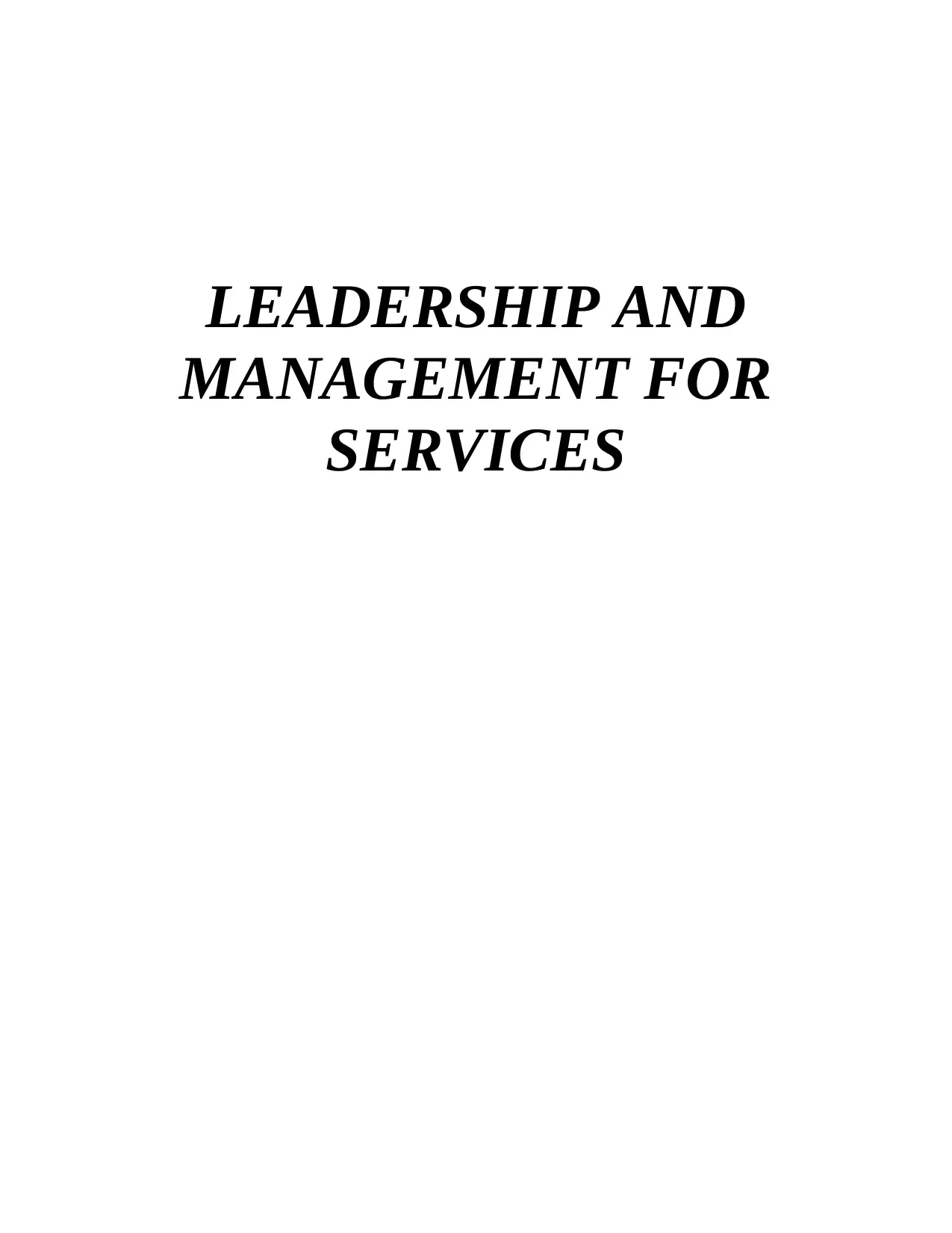
LEADERSHIP AND
MANAGEMENT FOR
SERVICES
MANAGEMENT FOR
SERVICES
Paraphrase This Document
Need a fresh take? Get an instant paraphrase of this document with our AI Paraphraser
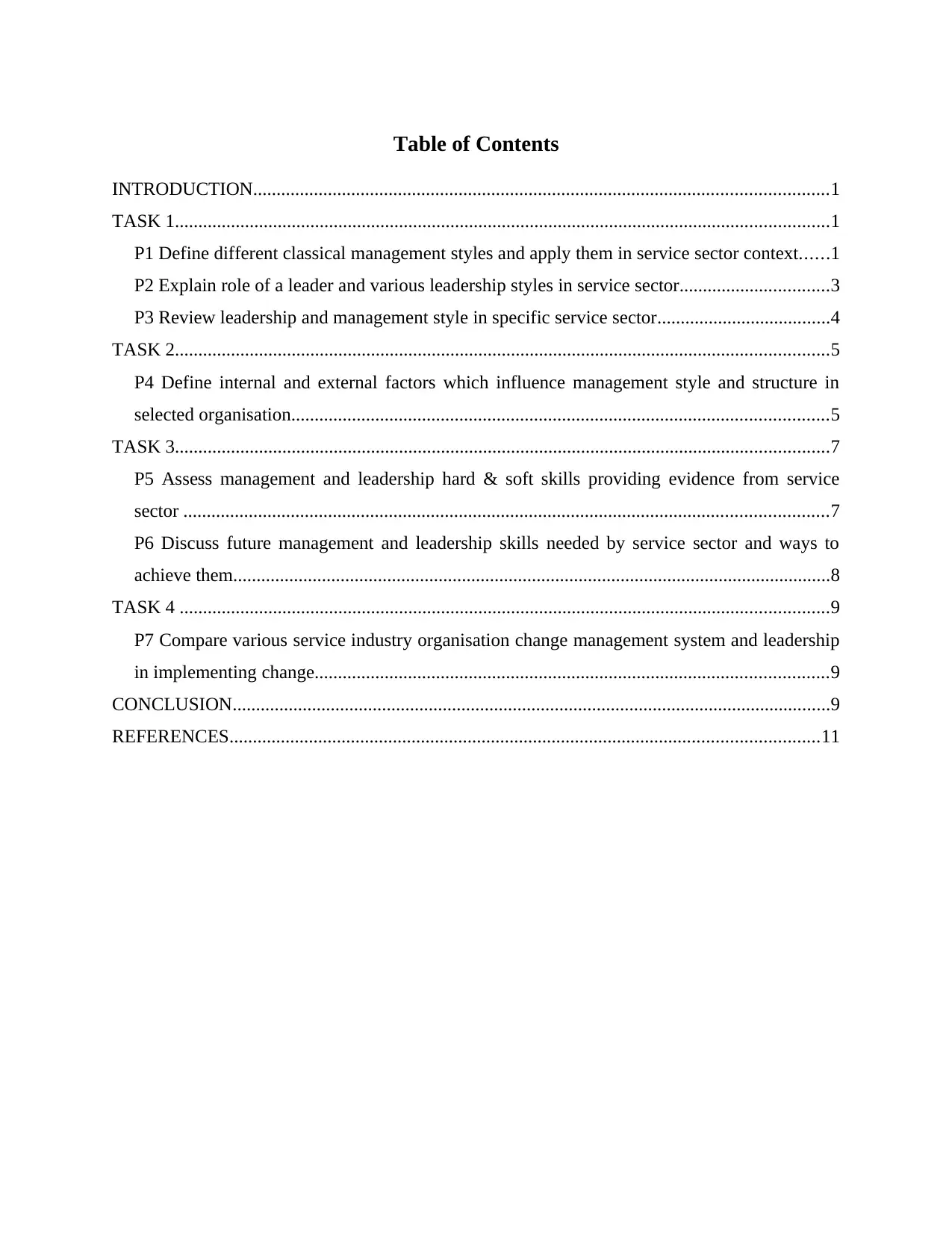
Table of Contents
INTRODUCTION...........................................................................................................................1
TASK 1............................................................................................................................................1
P1 Define different classical management styles and apply them in service sector context......1
P2 Explain role of a leader and various leadership styles in service sector................................3
P3 Review leadership and management style in specific service sector.....................................4
TASK 2............................................................................................................................................5
P4 Define internal and external factors which influence management style and structure in
selected organisation...................................................................................................................5
TASK 3............................................................................................................................................7
P5 Assess management and leadership hard & soft skills providing evidence from service
sector ..........................................................................................................................................7
P6 Discuss future management and leadership skills needed by service sector and ways to
achieve them................................................................................................................................8
TASK 4 ...........................................................................................................................................9
P7 Compare various service industry organisation change management system and leadership
in implementing change..............................................................................................................9
CONCLUSION................................................................................................................................9
REFERENCES..............................................................................................................................11
INTRODUCTION...........................................................................................................................1
TASK 1............................................................................................................................................1
P1 Define different classical management styles and apply them in service sector context......1
P2 Explain role of a leader and various leadership styles in service sector................................3
P3 Review leadership and management style in specific service sector.....................................4
TASK 2............................................................................................................................................5
P4 Define internal and external factors which influence management style and structure in
selected organisation...................................................................................................................5
TASK 3............................................................................................................................................7
P5 Assess management and leadership hard & soft skills providing evidence from service
sector ..........................................................................................................................................7
P6 Discuss future management and leadership skills needed by service sector and ways to
achieve them................................................................................................................................8
TASK 4 ...........................................................................................................................................9
P7 Compare various service industry organisation change management system and leadership
in implementing change..............................................................................................................9
CONCLUSION................................................................................................................................9
REFERENCES..............................................................................................................................11
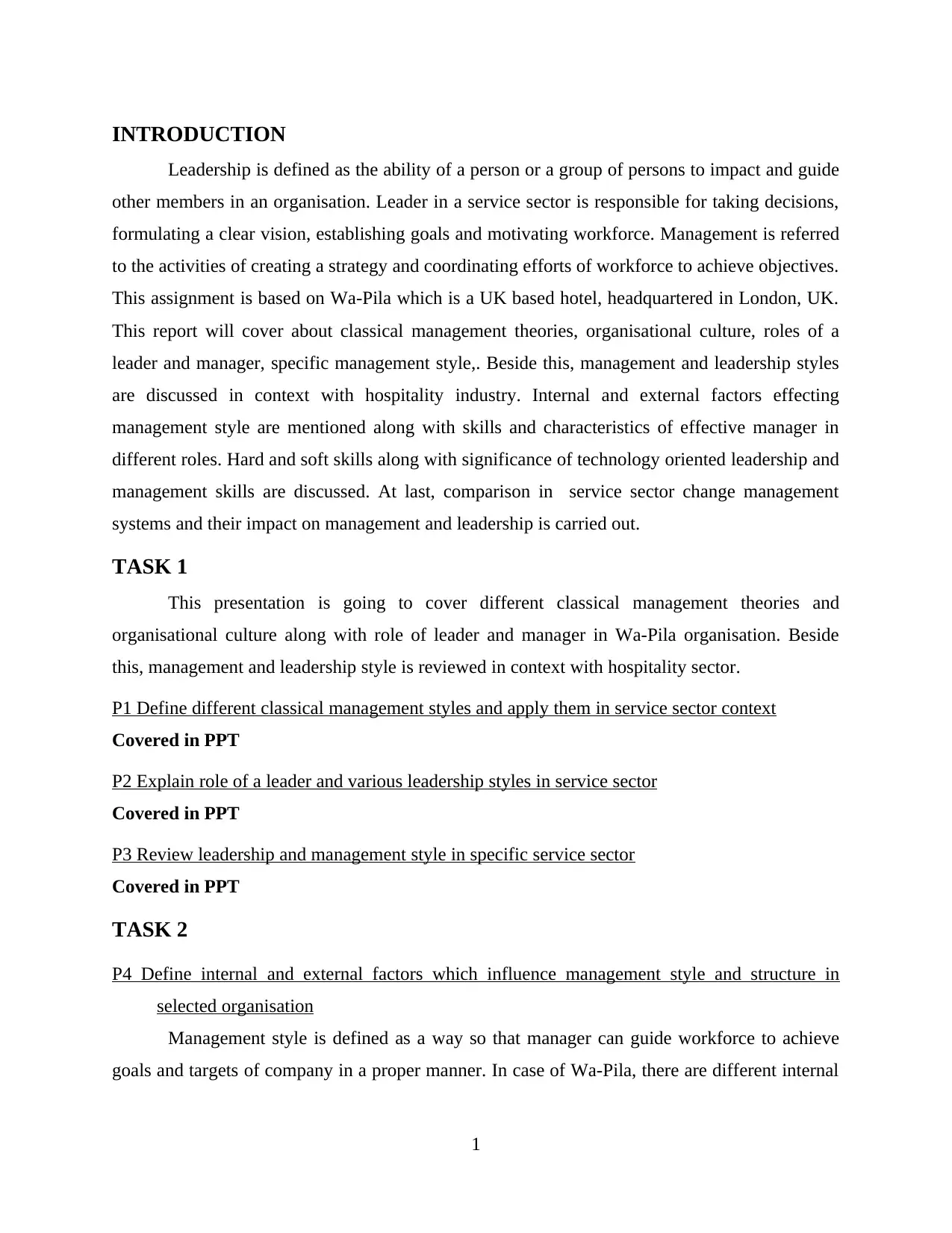
INTRODUCTION
Leadership is defined as the ability of a person or a group of persons to impact and guide
other members in an organisation. Leader in a service sector is responsible for taking decisions,
formulating a clear vision, establishing goals and motivating workforce. Management is referred
to the activities of creating a strategy and coordinating efforts of workforce to achieve objectives.
This assignment is based on Wa-Pila which is a UK based hotel, headquartered in London, UK.
This report will cover about classical management theories, organisational culture, roles of a
leader and manager, specific management style,. Beside this, management and leadership styles
are discussed in context with hospitality industry. Internal and external factors effecting
management style are mentioned along with skills and characteristics of effective manager in
different roles. Hard and soft skills along with significance of technology oriented leadership and
management skills are discussed. At last, comparison in service sector change management
systems and their impact on management and leadership is carried out.
TASK 1
This presentation is going to cover different classical management theories and
organisational culture along with role of leader and manager in Wa-Pila organisation. Beside
this, management and leadership style is reviewed in context with hospitality sector.
P1 Define different classical management styles and apply them in service sector context
Covered in PPT
P2 Explain role of a leader and various leadership styles in service sector
Covered in PPT
P3 Review leadership and management style in specific service sector
Covered in PPT
TASK 2
P4 Define internal and external factors which influence management style and structure in
selected organisation
Management style is defined as a way so that manager can guide workforce to achieve
goals and targets of company in a proper manner. In case of Wa-Pila, there are different internal
1
Leadership is defined as the ability of a person or a group of persons to impact and guide
other members in an organisation. Leader in a service sector is responsible for taking decisions,
formulating a clear vision, establishing goals and motivating workforce. Management is referred
to the activities of creating a strategy and coordinating efforts of workforce to achieve objectives.
This assignment is based on Wa-Pila which is a UK based hotel, headquartered in London, UK.
This report will cover about classical management theories, organisational culture, roles of a
leader and manager, specific management style,. Beside this, management and leadership styles
are discussed in context with hospitality industry. Internal and external factors effecting
management style are mentioned along with skills and characteristics of effective manager in
different roles. Hard and soft skills along with significance of technology oriented leadership and
management skills are discussed. At last, comparison in service sector change management
systems and their impact on management and leadership is carried out.
TASK 1
This presentation is going to cover different classical management theories and
organisational culture along with role of leader and manager in Wa-Pila organisation. Beside
this, management and leadership style is reviewed in context with hospitality sector.
P1 Define different classical management styles and apply them in service sector context
Covered in PPT
P2 Explain role of a leader and various leadership styles in service sector
Covered in PPT
P3 Review leadership and management style in specific service sector
Covered in PPT
TASK 2
P4 Define internal and external factors which influence management style and structure in
selected organisation
Management style is defined as a way so that manager can guide workforce to achieve
goals and targets of company in a proper manner. In case of Wa-Pila, there are different internal
1
⊘ This is a preview!⊘
Do you want full access?
Subscribe today to unlock all pages.

Trusted by 1+ million students worldwide
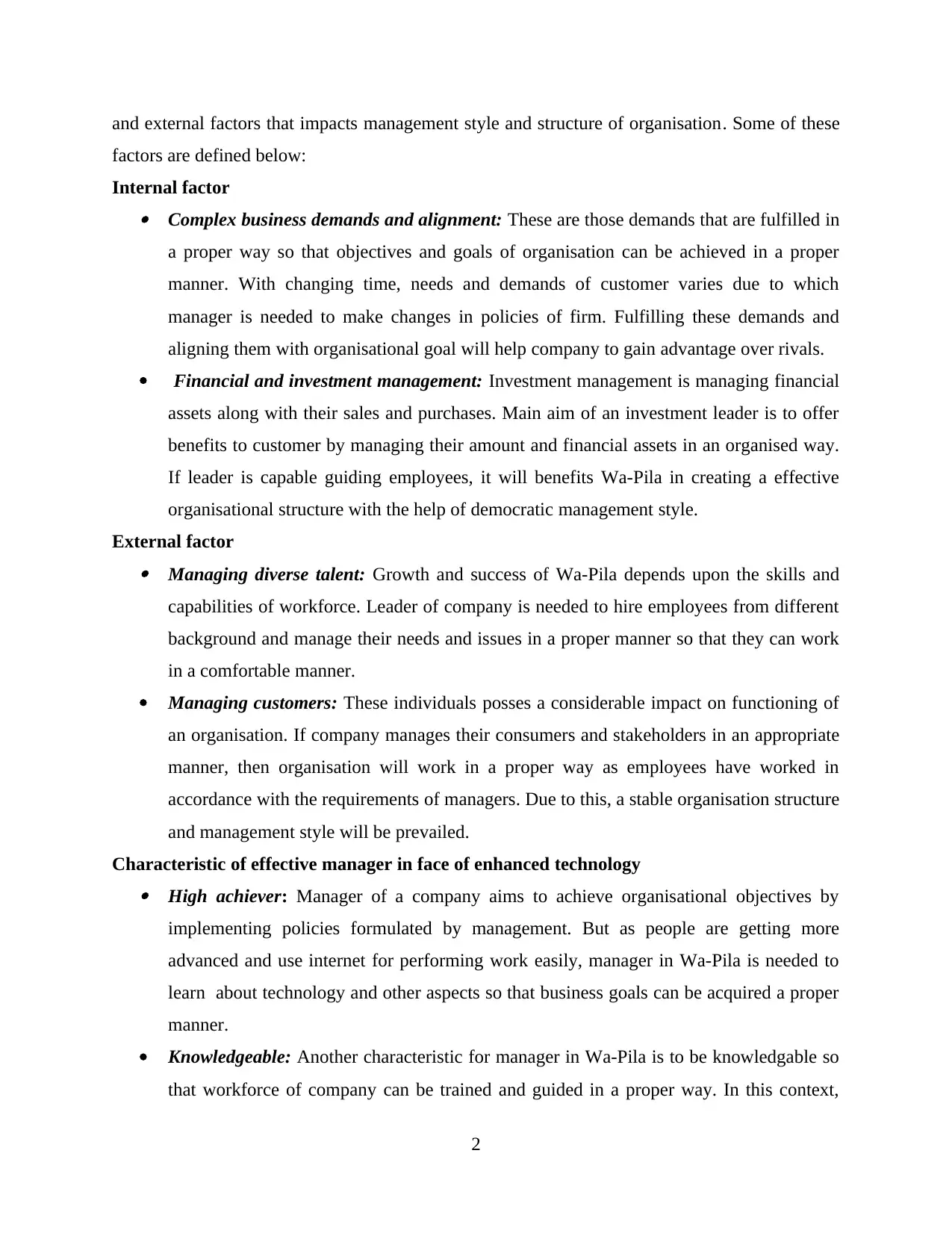
and external factors that impacts management style and structure of organisation. Some of these
factors are defined below:
Internal factor Complex business demands and alignment: These are those demands that are fulfilled in
a proper way so that objectives and goals of organisation can be achieved in a proper
manner. With changing time, needs and demands of customer varies due to which
manager is needed to make changes in policies of firm. Fulfilling these demands and
aligning them with organisational goal will help company to gain advantage over rivals.
Financial and investment management: Investment management is managing financial
assets along with their sales and purchases. Main aim of an investment leader is to offer
benefits to customer by managing their amount and financial assets in an organised way.
If leader is capable guiding employees, it will benefits Wa-Pila in creating a effective
organisational structure with the help of democratic management style.
External factor Managing diverse talent: Growth and success of Wa-Pila depends upon the skills and
capabilities of workforce. Leader of company is needed to hire employees from different
background and manage their needs and issues in a proper manner so that they can work
in a comfortable manner.
Managing customers: These individuals posses a considerable impact on functioning of
an organisation. If company manages their consumers and stakeholders in an appropriate
manner, then organisation will work in a proper way as employees have worked in
accordance with the requirements of managers. Due to this, a stable organisation structure
and management style will be prevailed.
Characteristic of effective manager in face of enhanced technology High achiever: Manager of a company aims to achieve organisational objectives by
implementing policies formulated by management. But as people are getting more
advanced and use internet for performing work easily, manager in Wa-Pila is needed to
learn about technology and other aspects so that business goals can be acquired a proper
manner.
Knowledgeable: Another characteristic for manager in Wa-Pila is to be knowledgable so
that workforce of company can be trained and guided in a proper way. In this context,
2
factors are defined below:
Internal factor Complex business demands and alignment: These are those demands that are fulfilled in
a proper way so that objectives and goals of organisation can be achieved in a proper
manner. With changing time, needs and demands of customer varies due to which
manager is needed to make changes in policies of firm. Fulfilling these demands and
aligning them with organisational goal will help company to gain advantage over rivals.
Financial and investment management: Investment management is managing financial
assets along with their sales and purchases. Main aim of an investment leader is to offer
benefits to customer by managing their amount and financial assets in an organised way.
If leader is capable guiding employees, it will benefits Wa-Pila in creating a effective
organisational structure with the help of democratic management style.
External factor Managing diverse talent: Growth and success of Wa-Pila depends upon the skills and
capabilities of workforce. Leader of company is needed to hire employees from different
background and manage their needs and issues in a proper manner so that they can work
in a comfortable manner.
Managing customers: These individuals posses a considerable impact on functioning of
an organisation. If company manages their consumers and stakeholders in an appropriate
manner, then organisation will work in a proper way as employees have worked in
accordance with the requirements of managers. Due to this, a stable organisation structure
and management style will be prevailed.
Characteristic of effective manager in face of enhanced technology High achiever: Manager of a company aims to achieve organisational objectives by
implementing policies formulated by management. But as people are getting more
advanced and use internet for performing work easily, manager in Wa-Pila is needed to
learn about technology and other aspects so that business goals can be acquired a proper
manner.
Knowledgeable: Another characteristic for manager in Wa-Pila is to be knowledgable so
that workforce of company can be trained and guided in a proper way. In this context,
2
Paraphrase This Document
Need a fresh take? Get an instant paraphrase of this document with our AI Paraphraser
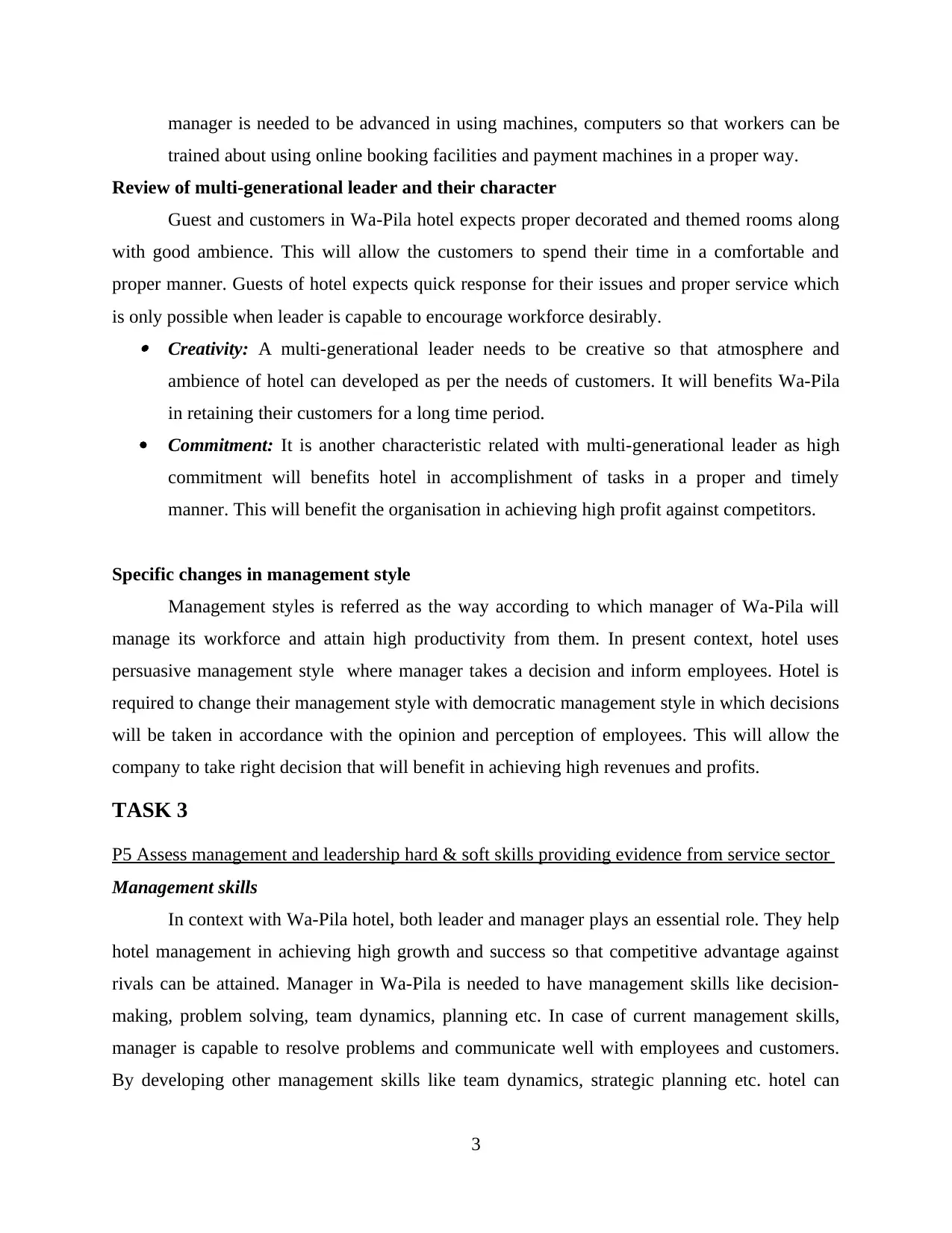
manager is needed to be advanced in using machines, computers so that workers can be
trained about using online booking facilities and payment machines in a proper way.
Review of multi-generational leader and their character
Guest and customers in Wa-Pila hotel expects proper decorated and themed rooms along
with good ambience. This will allow the customers to spend their time in a comfortable and
proper manner. Guests of hotel expects quick response for their issues and proper service which
is only possible when leader is capable to encourage workforce desirably. Creativity: A multi-generational leader needs to be creative so that atmosphere and
ambience of hotel can developed as per the needs of customers. It will benefits Wa-Pila
in retaining their customers for a long time period.
Commitment: It is another characteristic related with multi-generational leader as high
commitment will benefits hotel in accomplishment of tasks in a proper and timely
manner. This will benefit the organisation in achieving high profit against competitors.
Specific changes in management style
Management styles is referred as the way according to which manager of Wa-Pila will
manage its workforce and attain high productivity from them. In present context, hotel uses
persuasive management style where manager takes a decision and inform employees. Hotel is
required to change their management style with democratic management style in which decisions
will be taken in accordance with the opinion and perception of employees. This will allow the
company to take right decision that will benefit in achieving high revenues and profits.
TASK 3
P5 Assess management and leadership hard & soft skills providing evidence from service sector
Management skills
In context with Wa-Pila hotel, both leader and manager plays an essential role. They help
hotel management in achieving high growth and success so that competitive advantage against
rivals can be attained. Manager in Wa-Pila is needed to have management skills like decision-
making, problem solving, team dynamics, planning etc. In case of current management skills,
manager is capable to resolve problems and communicate well with employees and customers.
By developing other management skills like team dynamics, strategic planning etc. hotel can
3
trained about using online booking facilities and payment machines in a proper way.
Review of multi-generational leader and their character
Guest and customers in Wa-Pila hotel expects proper decorated and themed rooms along
with good ambience. This will allow the customers to spend their time in a comfortable and
proper manner. Guests of hotel expects quick response for their issues and proper service which
is only possible when leader is capable to encourage workforce desirably. Creativity: A multi-generational leader needs to be creative so that atmosphere and
ambience of hotel can developed as per the needs of customers. It will benefits Wa-Pila
in retaining their customers for a long time period.
Commitment: It is another characteristic related with multi-generational leader as high
commitment will benefits hotel in accomplishment of tasks in a proper and timely
manner. This will benefit the organisation in achieving high profit against competitors.
Specific changes in management style
Management styles is referred as the way according to which manager of Wa-Pila will
manage its workforce and attain high productivity from them. In present context, hotel uses
persuasive management style where manager takes a decision and inform employees. Hotel is
required to change their management style with democratic management style in which decisions
will be taken in accordance with the opinion and perception of employees. This will allow the
company to take right decision that will benefit in achieving high revenues and profits.
TASK 3
P5 Assess management and leadership hard & soft skills providing evidence from service sector
Management skills
In context with Wa-Pila hotel, both leader and manager plays an essential role. They help
hotel management in achieving high growth and success so that competitive advantage against
rivals can be attained. Manager in Wa-Pila is needed to have management skills like decision-
making, problem solving, team dynamics, planning etc. In case of current management skills,
manager is capable to resolve problems and communicate well with employees and customers.
By developing other management skills like team dynamics, strategic planning etc. hotel can
3
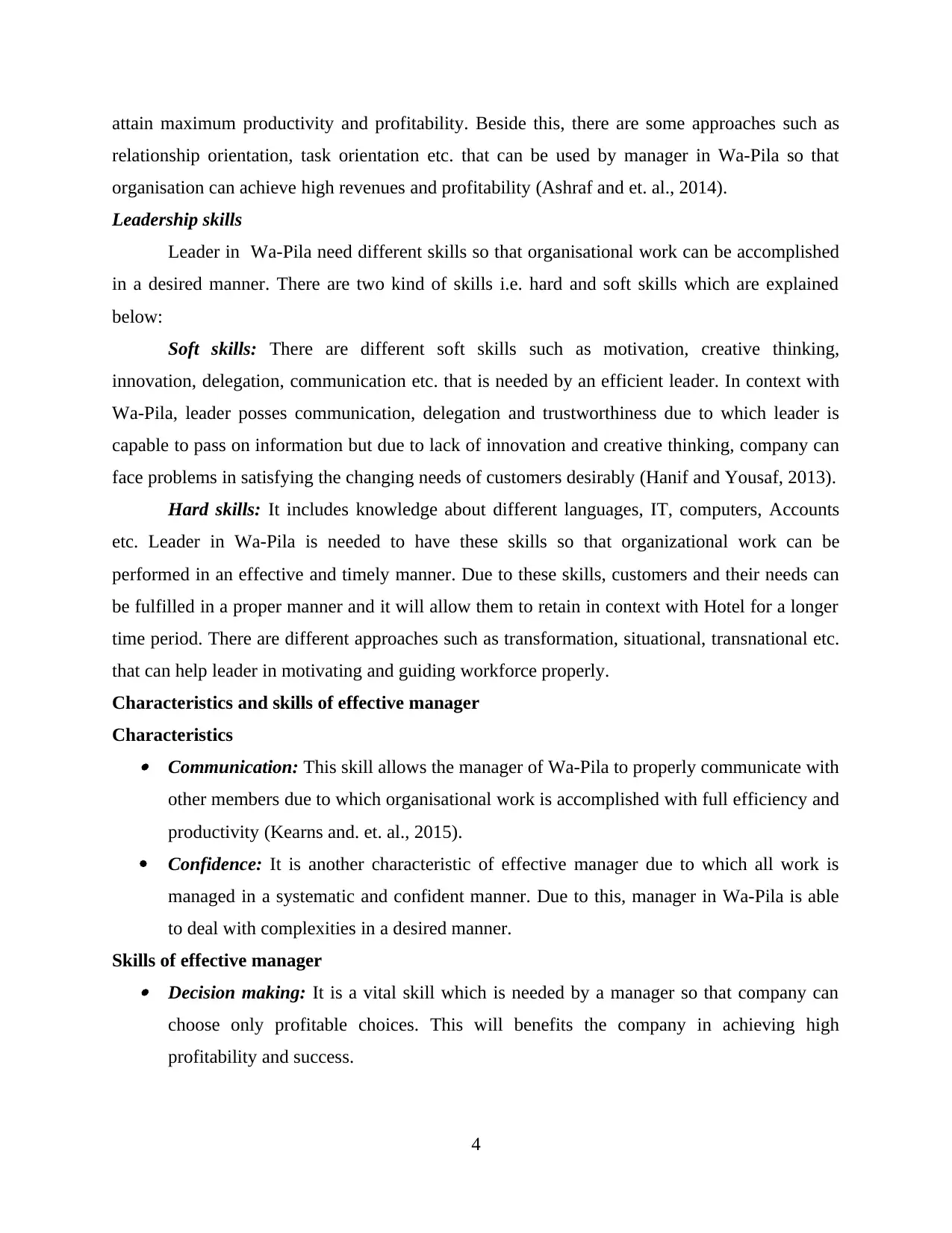
attain maximum productivity and profitability. Beside this, there are some approaches such as
relationship orientation, task orientation etc. that can be used by manager in Wa-Pila so that
organisation can achieve high revenues and profitability (Ashraf and et. al., 2014).
Leadership skills
Leader in Wa-Pila need different skills so that organisational work can be accomplished
in a desired manner. There are two kind of skills i.e. hard and soft skills which are explained
below:
Soft skills: There are different soft skills such as motivation, creative thinking,
innovation, delegation, communication etc. that is needed by an efficient leader. In context with
Wa-Pila, leader posses communication, delegation and trustworthiness due to which leader is
capable to pass on information but due to lack of innovation and creative thinking, company can
face problems in satisfying the changing needs of customers desirably (Hanif and Yousaf, 2013).
Hard skills: It includes knowledge about different languages, IT, computers, Accounts
etc. Leader in Wa-Pila is needed to have these skills so that organizational work can be
performed in an effective and timely manner. Due to these skills, customers and their needs can
be fulfilled in a proper manner and it will allow them to retain in context with Hotel for a longer
time period. There are different approaches such as transformation, situational, transnational etc.
that can help leader in motivating and guiding workforce properly.
Characteristics and skills of effective manager
Characteristics Communication: This skill allows the manager of Wa-Pila to properly communicate with
other members due to which organisational work is accomplished with full efficiency and
productivity (Kearns and. et. al., 2015).
Confidence: It is another characteristic of effective manager due to which all work is
managed in a systematic and confident manner. Due to this, manager in Wa-Pila is able
to deal with complexities in a desired manner.
Skills of effective manager Decision making: It is a vital skill which is needed by a manager so that company can
choose only profitable choices. This will benefits the company in achieving high
profitability and success.
4
relationship orientation, task orientation etc. that can be used by manager in Wa-Pila so that
organisation can achieve high revenues and profitability (Ashraf and et. al., 2014).
Leadership skills
Leader in Wa-Pila need different skills so that organisational work can be accomplished
in a desired manner. There are two kind of skills i.e. hard and soft skills which are explained
below:
Soft skills: There are different soft skills such as motivation, creative thinking,
innovation, delegation, communication etc. that is needed by an efficient leader. In context with
Wa-Pila, leader posses communication, delegation and trustworthiness due to which leader is
capable to pass on information but due to lack of innovation and creative thinking, company can
face problems in satisfying the changing needs of customers desirably (Hanif and Yousaf, 2013).
Hard skills: It includes knowledge about different languages, IT, computers, Accounts
etc. Leader in Wa-Pila is needed to have these skills so that organizational work can be
performed in an effective and timely manner. Due to these skills, customers and their needs can
be fulfilled in a proper manner and it will allow them to retain in context with Hotel for a longer
time period. There are different approaches such as transformation, situational, transnational etc.
that can help leader in motivating and guiding workforce properly.
Characteristics and skills of effective manager
Characteristics Communication: This skill allows the manager of Wa-Pila to properly communicate with
other members due to which organisational work is accomplished with full efficiency and
productivity (Kearns and. et. al., 2015).
Confidence: It is another characteristic of effective manager due to which all work is
managed in a systematic and confident manner. Due to this, manager in Wa-Pila is able
to deal with complexities in a desired manner.
Skills of effective manager Decision making: It is a vital skill which is needed by a manager so that company can
choose only profitable choices. This will benefits the company in achieving high
profitability and success.
4
⊘ This is a preview!⊘
Do you want full access?
Subscribe today to unlock all pages.

Trusted by 1+ million students worldwide
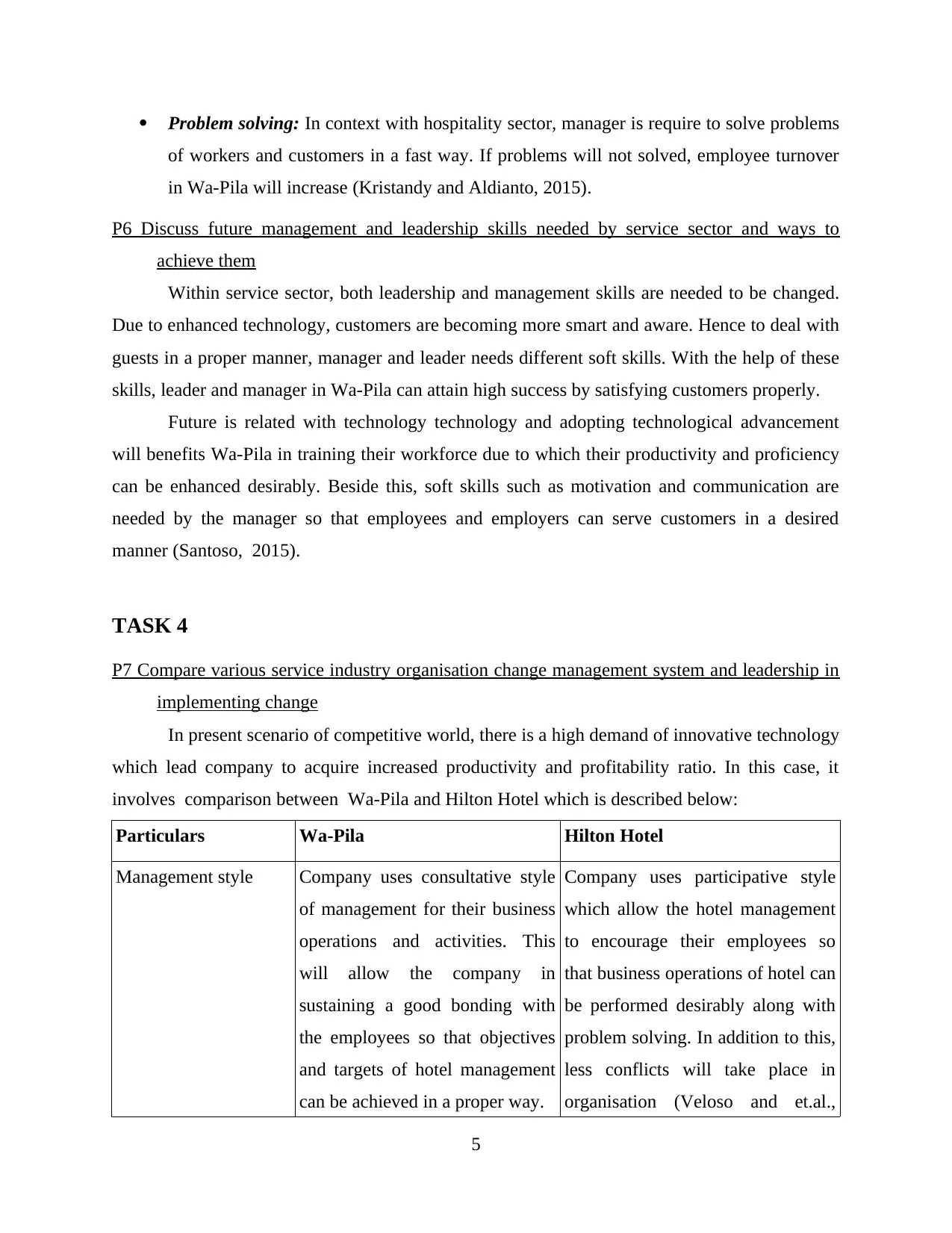
Problem solving: In context with hospitality sector, manager is require to solve problems
of workers and customers in a fast way. If problems will not solved, employee turnover
in Wa-Pila will increase (Kristandy and Aldianto, 2015).
P6 Discuss future management and leadership skills needed by service sector and ways to
achieve them
Within service sector, both leadership and management skills are needed to be changed.
Due to enhanced technology, customers are becoming more smart and aware. Hence to deal with
guests in a proper manner, manager and leader needs different soft skills. With the help of these
skills, leader and manager in Wa-Pila can attain high success by satisfying customers properly.
Future is related with technology technology and adopting technological advancement
will benefits Wa-Pila in training their workforce due to which their productivity and proficiency
can be enhanced desirably. Beside this, soft skills such as motivation and communication are
needed by the manager so that employees and employers can serve customers in a desired
manner (Santoso, 2015).
TASK 4
P7 Compare various service industry organisation change management system and leadership in
implementing change
In present scenario of competitive world, there is a high demand of innovative technology
which lead company to acquire increased productivity and profitability ratio. In this case, it
involves comparison between Wa-Pila and Hilton Hotel which is described below:
Particulars Wa-Pila Hilton Hotel
Management style Company uses consultative style
of management for their business
operations and activities. This
will allow the company in
sustaining a good bonding with
the employees so that objectives
and targets of hotel management
can be achieved in a proper way.
Company uses participative style
which allow the hotel management
to encourage their employees so
that business operations of hotel can
be performed desirably along with
problem solving. In addition to this,
less conflicts will take place in
organisation (Veloso and et.al.,
5
of workers and customers in a fast way. If problems will not solved, employee turnover
in Wa-Pila will increase (Kristandy and Aldianto, 2015).
P6 Discuss future management and leadership skills needed by service sector and ways to
achieve them
Within service sector, both leadership and management skills are needed to be changed.
Due to enhanced technology, customers are becoming more smart and aware. Hence to deal with
guests in a proper manner, manager and leader needs different soft skills. With the help of these
skills, leader and manager in Wa-Pila can attain high success by satisfying customers properly.
Future is related with technology technology and adopting technological advancement
will benefits Wa-Pila in training their workforce due to which their productivity and proficiency
can be enhanced desirably. Beside this, soft skills such as motivation and communication are
needed by the manager so that employees and employers can serve customers in a desired
manner (Santoso, 2015).
TASK 4
P7 Compare various service industry organisation change management system and leadership in
implementing change
In present scenario of competitive world, there is a high demand of innovative technology
which lead company to acquire increased productivity and profitability ratio. In this case, it
involves comparison between Wa-Pila and Hilton Hotel which is described below:
Particulars Wa-Pila Hilton Hotel
Management style Company uses consultative style
of management for their business
operations and activities. This
will allow the company in
sustaining a good bonding with
the employees so that objectives
and targets of hotel management
can be achieved in a proper way.
Company uses participative style
which allow the hotel management
to encourage their employees so
that business operations of hotel can
be performed desirably along with
problem solving. In addition to this,
less conflicts will take place in
organisation (Veloso and et.al.,
5
Paraphrase This Document
Need a fresh take? Get an instant paraphrase of this document with our AI Paraphraser
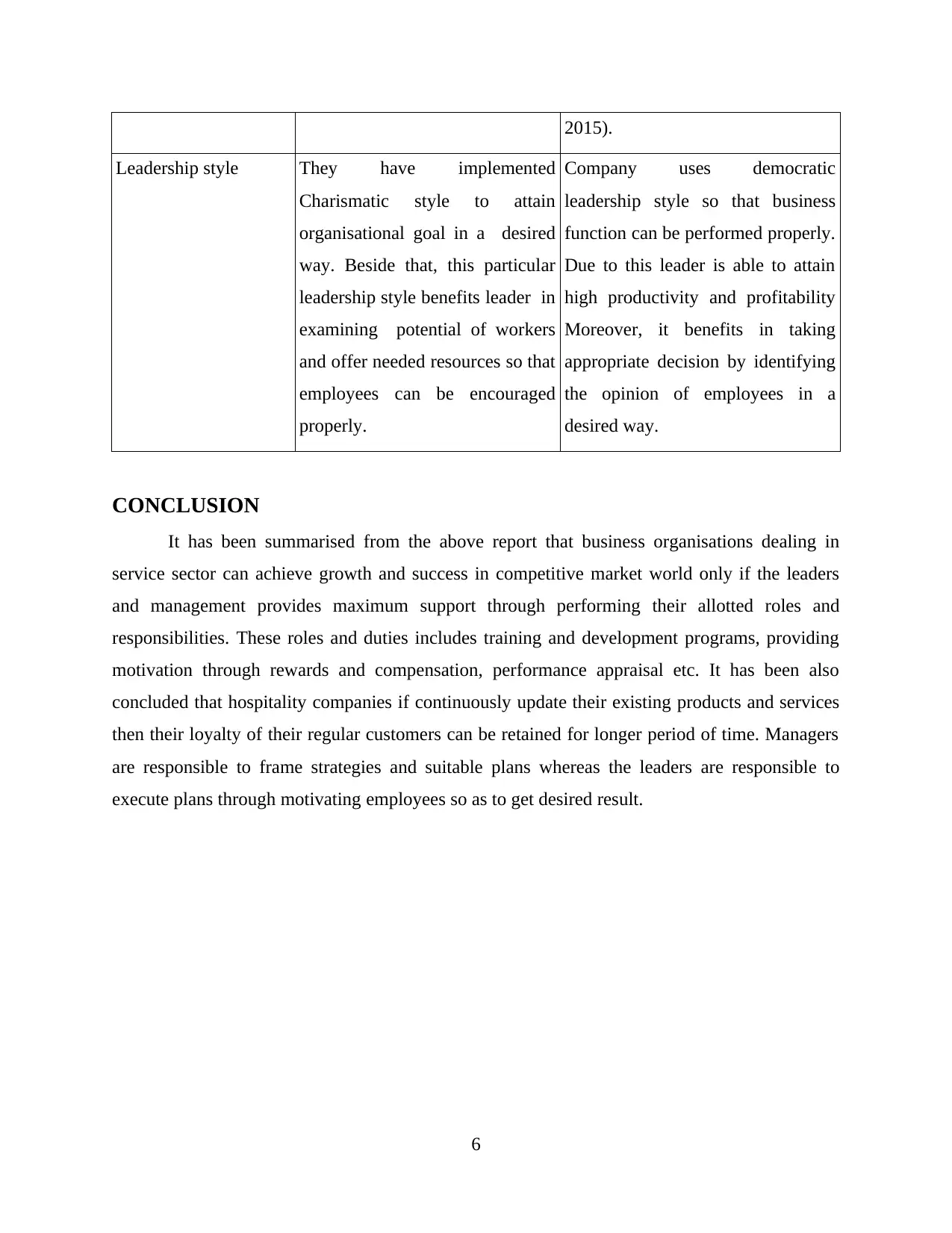
2015).
Leadership style They have implemented
Charismatic style to attain
organisational goal in a desired
way. Beside that, this particular
leadership style benefits leader in
examining potential of workers
and offer needed resources so that
employees can be encouraged
properly.
Company uses democratic
leadership style so that business
function can be performed properly.
Due to this leader is able to attain
high productivity and profitability
Moreover, it benefits in taking
appropriate decision by identifying
the opinion of employees in a
desired way.
CONCLUSION
It has been summarised from the above report that business organisations dealing in
service sector can achieve growth and success in competitive market world only if the leaders
and management provides maximum support through performing their allotted roles and
responsibilities. These roles and duties includes training and development programs, providing
motivation through rewards and compensation, performance appraisal etc. It has been also
concluded that hospitality companies if continuously update their existing products and services
then their loyalty of their regular customers can be retained for longer period of time. Managers
are responsible to frame strategies and suitable plans whereas the leaders are responsible to
execute plans through motivating employees so as to get desired result.
6
Leadership style They have implemented
Charismatic style to attain
organisational goal in a desired
way. Beside that, this particular
leadership style benefits leader in
examining potential of workers
and offer needed resources so that
employees can be encouraged
properly.
Company uses democratic
leadership style so that business
function can be performed properly.
Due to this leader is able to attain
high productivity and profitability
Moreover, it benefits in taking
appropriate decision by identifying
the opinion of employees in a
desired way.
CONCLUSION
It has been summarised from the above report that business organisations dealing in
service sector can achieve growth and success in competitive market world only if the leaders
and management provides maximum support through performing their allotted roles and
responsibilities. These roles and duties includes training and development programs, providing
motivation through rewards and compensation, performance appraisal etc. It has been also
concluded that hospitality companies if continuously update their existing products and services
then their loyalty of their regular customers can be retained for longer period of time. Managers
are responsible to frame strategies and suitable plans whereas the leaders are responsible to
execute plans through motivating employees so as to get desired result.
6
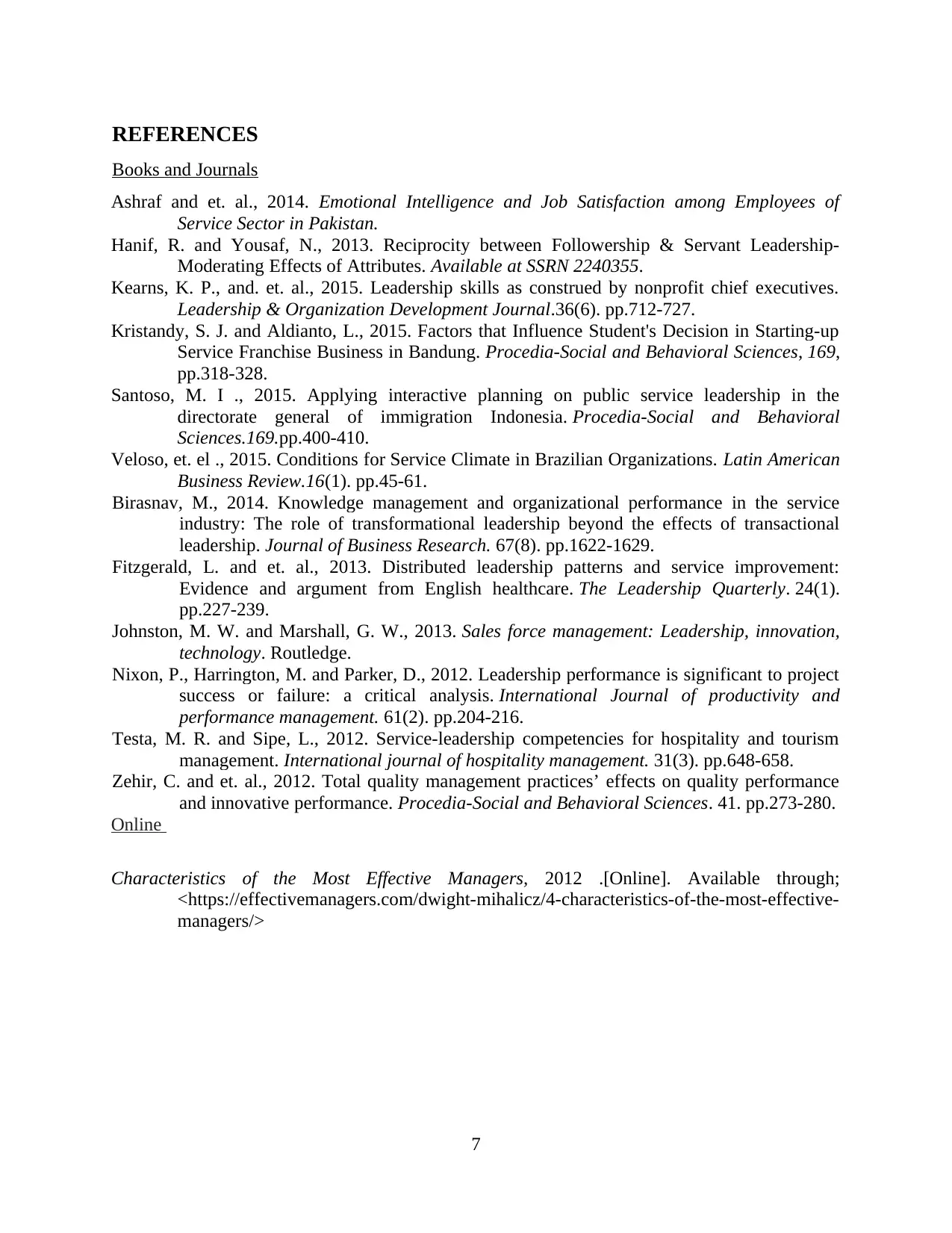
REFERENCES
Books and Journals
Ashraf and et. al., 2014. Emotional Intelligence and Job Satisfaction among Employees of
Service Sector in Pakistan.
Hanif, R. and Yousaf, N., 2013. Reciprocity between Followership & Servant Leadership-
Moderating Effects of Attributes. Available at SSRN 2240355.
Kearns, K. P., and. et. al., 2015. Leadership skills as construed by nonprofit chief executives.
Leadership & Organization Development Journal.36(6). pp.712-727.
Kristandy, S. J. and Aldianto, L., 2015. Factors that Influence Student's Decision in Starting-up
Service Franchise Business in Bandung. Procedia-Social and Behavioral Sciences, 169,
pp.318-328.
Santoso, M. I ., 2015. Applying interactive planning on public service leadership in the
directorate general of immigration Indonesia. Procedia-Social and Behavioral
Sciences.169.pp.400-410.
Veloso, et. el ., 2015. Conditions for Service Climate in Brazilian Organizations. Latin American
Business Review.16(1). pp.45-61.
Birasnav, M., 2014. Knowledge management and organizational performance in the service
industry: The role of transformational leadership beyond the effects of transactional
leadership. Journal of Business Research. 67(8). pp.1622-1629.
Fitzgerald, L. and et. al., 2013. Distributed leadership patterns and service improvement:
Evidence and argument from English healthcare. The Leadership Quarterly. 24(1).
pp.227-239.
Johnston, M. W. and Marshall, G. W., 2013. Sales force management: Leadership, innovation,
technology. Routledge.
Nixon, P., Harrington, M. and Parker, D., 2012. Leadership performance is significant to project
success or failure: a critical analysis. International Journal of productivity and
performance management. 61(2). pp.204-216.
Testa, M. R. and Sipe, L., 2012. Service-leadership competencies for hospitality and tourism
management. International journal of hospitality management. 31(3). pp.648-658.
Zehir, C. and et. al., 2012. Total quality management practices’ effects on quality performance
and innovative performance. Procedia-Social and Behavioral Sciences. 41. pp.273-280.
Online
Characteristics of the Most Effective Managers, 2012 .[Online]. Available through;
<https://effectivemanagers.com/dwight-mihalicz/4-characteristics-of-the-most-effective-
managers/>
7
Books and Journals
Ashraf and et. al., 2014. Emotional Intelligence and Job Satisfaction among Employees of
Service Sector in Pakistan.
Hanif, R. and Yousaf, N., 2013. Reciprocity between Followership & Servant Leadership-
Moderating Effects of Attributes. Available at SSRN 2240355.
Kearns, K. P., and. et. al., 2015. Leadership skills as construed by nonprofit chief executives.
Leadership & Organization Development Journal.36(6). pp.712-727.
Kristandy, S. J. and Aldianto, L., 2015. Factors that Influence Student's Decision in Starting-up
Service Franchise Business in Bandung. Procedia-Social and Behavioral Sciences, 169,
pp.318-328.
Santoso, M. I ., 2015. Applying interactive planning on public service leadership in the
directorate general of immigration Indonesia. Procedia-Social and Behavioral
Sciences.169.pp.400-410.
Veloso, et. el ., 2015. Conditions for Service Climate in Brazilian Organizations. Latin American
Business Review.16(1). pp.45-61.
Birasnav, M., 2014. Knowledge management and organizational performance in the service
industry: The role of transformational leadership beyond the effects of transactional
leadership. Journal of Business Research. 67(8). pp.1622-1629.
Fitzgerald, L. and et. al., 2013. Distributed leadership patterns and service improvement:
Evidence and argument from English healthcare. The Leadership Quarterly. 24(1).
pp.227-239.
Johnston, M. W. and Marshall, G. W., 2013. Sales force management: Leadership, innovation,
technology. Routledge.
Nixon, P., Harrington, M. and Parker, D., 2012. Leadership performance is significant to project
success or failure: a critical analysis. International Journal of productivity and
performance management. 61(2). pp.204-216.
Testa, M. R. and Sipe, L., 2012. Service-leadership competencies for hospitality and tourism
management. International journal of hospitality management. 31(3). pp.648-658.
Zehir, C. and et. al., 2012. Total quality management practices’ effects on quality performance
and innovative performance. Procedia-Social and Behavioral Sciences. 41. pp.273-280.
Online
Characteristics of the Most Effective Managers, 2012 .[Online]. Available through;
<https://effectivemanagers.com/dwight-mihalicz/4-characteristics-of-the-most-effective-
managers/>
7
⊘ This is a preview!⊘
Do you want full access?
Subscribe today to unlock all pages.

Trusted by 1+ million students worldwide
1 out of 9
Related Documents
Your All-in-One AI-Powered Toolkit for Academic Success.
+13062052269
info@desklib.com
Available 24*7 on WhatsApp / Email
![[object Object]](/_next/static/media/star-bottom.7253800d.svg)
Unlock your academic potential
Copyright © 2020–2025 A2Z Services. All Rights Reserved. Developed and managed by ZUCOL.





